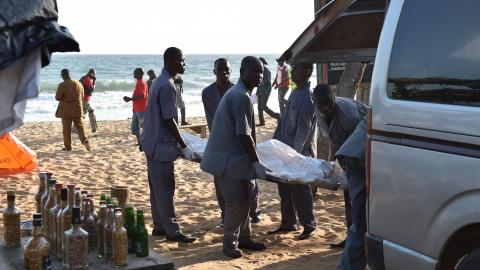Beach Horror: 22 dead in terrorist attack on Ivory Coast resorts

Photo Credit; Getty Images/AFP
By Michael E. Miller
Grand-Bassam’s beaches were busy Sunday afternoon. Soaring temperatures had driven people from across Ivory Coast to the city’s oceanfront resorts. Tourists and locals alike dove in the sea and lounged on the sand.
For al-Qaeda, it was an opportune moment to attack.
Six figures in black appeared on the beach. They wore balaclavas. They carried guns. They opened fire.
Armed with Kalashnikov rifles and hand grenades, the attackers marched across the sand, sowing death. They shot men, women and children. They shot Ivorians and foreigners. When security forces arrived, the gunmen killed two of them as well.
“They killed a child, despite him kneeling down and begging,” one witness said, according to the BBC. “They shot a woman in the chest. I swear, I heard them shouting ‘Allahu Akbar.’ They’ve killed innocent people.”
The killing came to a halt only when security forces fatally shot the six assailants.
The final tally: 22 dead, including the six gunmen, two soldiers and 14 civilians.
Among the dead civilians were four Westerners, including a French and a German national, according to the BBC. The U.S. Embassy in Abidjan said it had no evidence that U.S. citizens were targeted or harmed, according to the Associated Press.
Al-Qaeda in the Islamic Maghreb (AQIM) claimed responsibility for the attack, according to the SITE Intelligence Group, which monitors radical Islamist websites.
Grand-Bassam is a historic city that was the country’s first capital. It lies about 25 miles east of the present-day capital of Abidjan.
President Alassane Ouattara visited the shell-shocked city Sunday evening to express his condolences and to praise the country’s security forces.
“These cowardly terrorist attacks will not be tolerated in the Ivory Coast,” he said, according to the BBC. “We have taken important measures. These attacks were brought under control in three or four hours thanks to our security and defense forces.”
The bloodshed followed several similar attacks in neighboring countries in recent months.
In November, a siege on a hotel in the Malian capital of Bamako killed 27 hostages, including one American. Another al-Qaeda affiliate, al-Mourabitoun, claimed responsibility.
[After deadly hotel attack, Burkina Faso contemplates a future with terrorism]
In January, a hotel attack in Burkina Faso killed at least 23 people, including an American. Two of the four assailants were women, and the attack was claimed by AQIM.
Those attacks led some security analysts to warn that Ivory Coast would be next, the AP reported.
The trio of attacks in West Africa has triggered fears that radical Islamist terror groups are extending their reach to previously untouched corners of the continent. All three incidents resembled an attack on a Tunisian beach in North Africa in June that killed 38 people and was claimed by the Islamic State.
For Ivorians at home and abroad, Sunday’s massacre dredged up terrible memories from the country’s bloody civil war, which raged on and off for nearly a decade until a tenuous 2011 peace agreement.
“We had the war here a few years ago, so we know automatic weapons when we hear them,” Koba Maiga, a local trader, told the Guardian.
He said he was at the mosque when he heard gunfire about 1.30 p.m. Although he stayed away from the beach, he spoke to friends who were at the beach and witnessed the attack.
“It was carnage,” he said. “They shouted ‘Allahu Akbar.’ They were getting people to shout those words and they killed anyone who didn’t. There were at least four of them. Three walked side-by-side along the beach and there was a fourth man who finished off any survivors.
“A lot of people ran out into the sea to escape. So apart from the people who died from gunshots there may be people who have drowned and have been swept out to sea,” he added. “They were sub-Saharan Africans. Even though they wore balaclavas everyone saw they had brown hands.”
Maiga was not the only one to claim that the gunmen spared Muslims and targeted Christians.
Marcel Guy said he saw a gunman approach two children on the beach and speak to them in Arabic. One of the kids knelt and began to pray. He was spared. The other child was not.
“The Christian boy was shot and killed right in front of my eyes,” Guy told the AP.
Video footage filmed from hotel terraces showed people racing from the beach as the gunmen advanced.
“Truly, truly it was terrifying,” one woman tearfully told Reuters. “It was definitely terrorists. We never thought this could happen here under these circumstances. It’s not easy. It’s not easy.”
Another man described seeing his friend killed in front of his eyes.
“He came up to my friend as he was speaking on the phone and shot him in the head,” the man told Reuters. “When he shot him in the head, he shouted Allahu Akbar, and at that moment three others arrived and started shooting.”
Yaya Touré, an Ivorian soccer star playing for the British team Manchester City, wrote on Facebook that he was praying for his home country.
“It is with a heavy heart that I learnt of the tragedy that befell my country on Sunday afternoon,” he wrote. “I am saying prayers for all the mourning families and offer comfort and support to the Ivorian population. Equally, the president of the republic who made the effort to manage the situation for the tranquility and peace in the Ivory Coast.
“May God watch over the Ivory Coast.”
Source: www.washingtonpost.com
